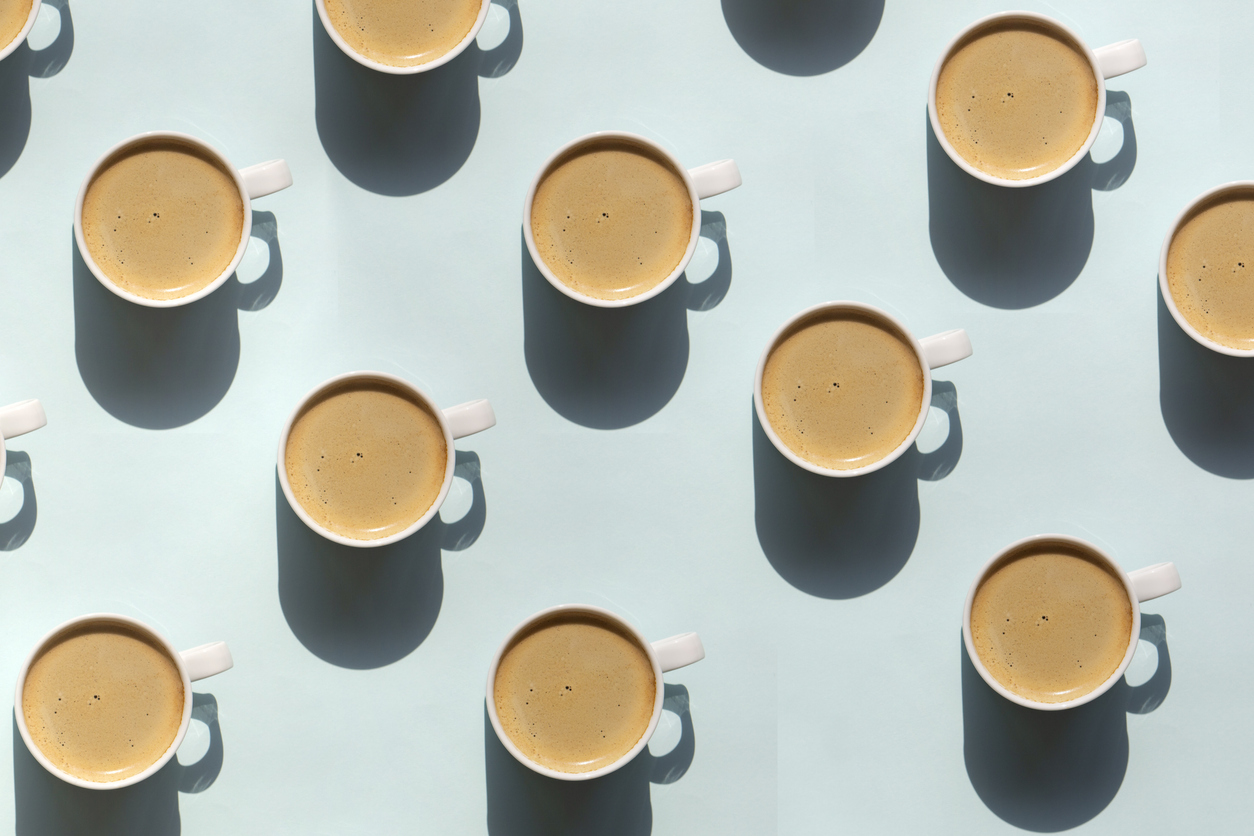The Latest Sleep Research: How Does Caffeine Impact Sleep?

Caffeine is the world’s most popular stimulant, mainly for its benefits of boosting energy and fighting drowsiness. However, caffeine can interfere with sleep, especially when consumed in the late afternoon and evening, yet many people enjoy drinking caffeinated beverages throughout the day rather than limiting their consumption to the morning only. Currently, there is little research examining how changing the timing or amount of caffeine consumption or abstaining from all caffeine affects sleep, but recent studies have sought to fill that gap.
Study 1:
Weibel and colleagues (2021) investigated whether consuming caffeine throughout the day affects sleep. They hypothesized that reduced depth of sleep after caffeine intake would occur, compared to a placebo. They also hypothesized that abruptly stopping daily intake of caffeine would lead to perceived withdrawal symptoms and changes in sleep, compared to daily intake and compared to placebo.
The study consisted of 20, healthy male volunteers with no sleep concerns who self-reported taking in between 300 and 600 mg of caffeine each day (approximately 3-6 cups of coffee).
Participants were assigned to one of three conditions: caffeine (150 mg capsule 3x day), placebo (capsule without caffeine 3x day), or withdrawal (150 mg caffeine capsule 3x day, then switch to placebo) for a 10-day period. Those in the caffeine and placebo condition took their capsules soon after waking in the morning, midday, and in the afternoon. The withdrawal condition followed the same schedule for the first 8 days but switched to a placebo capsule at midday for the remainder of the study. All participants were asked to follow a schedule of 8 hours of sleep, no napping, no additional sources of caffeine, to continuously wear an Actiwatch to measure sleep, and to keep daily sleep logs. After a 9-day period of their regular daily activity, participants spent the remainder of the study in a lab where they had their sleep tracked by polysomnography for one night.
Surprisingly, caffeine consumption in the morning, midday, or afternoon did not show any clear changes in nighttime sleep structure or self-reported sleep quality. The researchers found no significant differences between groups in time to fall asleep, amount of time spent awake after falling asleep, total amount of sleep, or sleep efficiency (percentage of time in bed spent sleeping). However, they noted that their findings cannot be generalized widely, given that this sample included only men who were 18-35 years old.
Study 2:
In a study of caffeine abstinence, Irish and colleagues (2021) studied 66 healthy college students with poor sleep who were instructed to stop using caffeine for a week.
The researchers looked at time to fall asleep, total sleep time, and sleep efficiency. They also examined relations among different aspects of caffeine use (frequency, timing, sensitivity) and sleep. They hypothesized that, overall, caffeine abstinence would not result in significant changes in sleep, because the participants in the study were already used to the effects of caffeine. However, they predicted that individuals who were not daily drinkers of caffeine, had caffeine later in the day, and reported being sensitive to the effects of caffeine, would experience sleep improvement.
The first phase of the study included education about caffeine and its sources, such as which beverages include caffeine. Based on self-report, participants were classified as either regular (6-7 days a week) or intermittent (3-5 days a week) users; as either early (average time of latest caffeine consumption before 2pm) or late users (average time of caffeine consumption at or after 2pm); and as either sensitive or not sensitive to caffeine.
For the duration of the study, participants wore an Actiwatch on the wrist to measure sleep. They also completed online sleep diaries each morning upon waking up and each evening before bed, to provide data about their perceived sleep and daily behaviors that could affect sleep.
After a two-week baseline period, participants whose data showed poor sleep (defined as, on average, taking 30 minutes or more to fall asleep, total sleep time of less than 7 hours, or sleep efficiency of less than 80%) were given a detailed list of caffeine sources to abstain from for the final week of the study as their sleep continued to be measured.
Results revealed that caffeine abstinence did not result in sleep improvement, as the researchers hypothesized. Interestingly, average time to fall asleep decreased about 10 minutes during the first 3 days of abstinence, but then increased to slightly higher than the pre-abstinence time to fall asleep. No significant changes in total sleep time or sleep efficiency were found. Contrary to the researchers’ predictions, the results did not differ based on whether individuals were classified as daily caffeine consumers, typically had caffeine later in the day, or were sensitive to the effects of caffeine.
Caffeine and Sleep
Together, these studies suggest the need for additional research on how caffeine affects sleep. While many people turn to cutting back or abstaining from caffeine as a strategy to improve their sleep, individual differences may influence the effectiveness of such recommendations.
Source 1:
Weibel, J., Lin, Y., Landolt, H., Kistler, J., Rehm, S., Rentsch, K. M., Slawik, S., Borgwardt, S., Cajochen, C., & Reichert, C. F. (2021). The impact of daily caffeine intake on nighttime sleep in young adult men. Scientific Reports, 11, 1-9. doi:10.1038/s41598-021-84088-x
Source 2:
Irish, L. A., Mead, M. P., Cao, L., Veronda, A. C., Crosby, R. D. (2021). The effect of caffeine abstinence on sleep among habitual caffeine users with poor sleep. Journal of Sleep Research, 30(1), 1-9. doi: 10.1111/jsr.13048